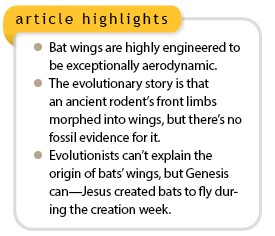How Did the Bat Get Its Wings?
 Where did bats come from? Evolutionists presuppose that some kind of rodent received just the right mutations to over “a few million years” turn its front legs into exceptionally aerodynamic wings.1
Where did bats come from? Evolutionists presuppose that some kind of rodent received just the right mutations to over “a few million years” turn its front legs into exceptionally aerodynamic wings.1

DNA in Sheep and Dinosaurs
About 1,600 years ago, salt miners in Iran apparently left their lamb lunch down the shaft. Their loss became scientists' gain. The now-mummified sheep carcass suggests that salt helps preserve sheepskin DNA.

Latest DNA Tech Still Light-Years Behind
Let’s say you recorded a library of books onto DNA. Hundreds of books could fit on your fingertip, but how would you find the one book you wanted?

Giant Rhinos Are Still Rhinos
Fossils from two giant rhinos dated by evolutionists to be “22 million years old” in the evolutionary timetable have been discovered in China.1 They were much larger than today’s rhinos and stood at over 20 feet, but they were still rhinos. This is true with many large animals found in the fossil record—vertebrate and invertebrate.

Diverse Devonian Plant Assemblage from Early Flood
Scientists recently discovered a diverse assemblage of fossils in South Africa claimed to be some of the earliest land plants.1 Known as seedless vascular plants, the fossils were determined to be from early Devonian system strata. Most shockingly, secular paleogeography models indicate these plants grew at about 75 degrees South Latitude, very close to the South Pole!



